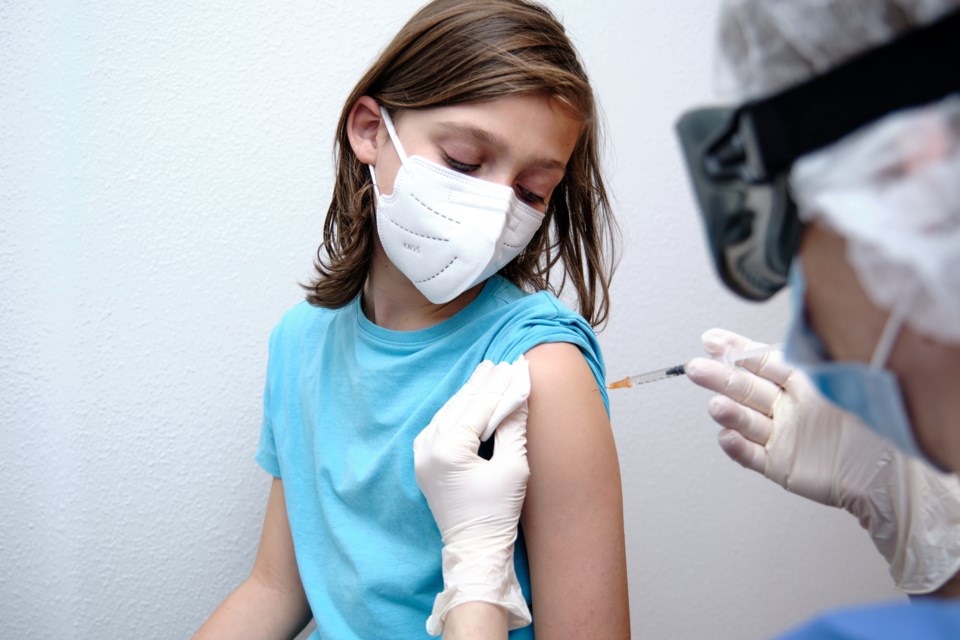“Bring it on!” St. John’s resident Danielle French wrote on Twitter in response to an informal poll. “Ten- and eight-year-old waiting here.”
French said her oldest wants to go to a hockey tournament out of the province, and she’d rather not send him without getting the vaccine.
Leisha Sagan of St. John’s said she intends to be first in line with her eight-year-old, but her four-year-old won’t be eligible yet.
“I can hardly wait for them to be vaccinated,” she said in a direct message to The Telegram. “For parents of kids, we are still careful, we are still mindful of our interactions and worry about them all the time being exposed to COVID.”
Her oldest is in a class of 26 children, Sagan said.
“He just started wearing a mask, thank goodness. It’s a constant balancing act during the entirety of the pandemic, weighing their mental health and development vs. COVID exposures and health risks — being able to send him to school, being able to have them see friends without worry, being in a few activities.”
Her eight-year-old’s last normal year of school was kindergarten, she said. He’s in Grade 3 now.
“I think a lot of people underestimate the effect of the pandemic on kids and families still,” she said.
Just over 80 per cent of more than 300 people who responded to a Twitter poll Monday indicated they would make sure their children got the jab.
That’s a little higher than that of a more scientific poll conducted by Angus Reid in October that found 23 per cent of Canadian parents would actually not get the vaccine, although numbers varied across regions.
Less uptake may make herd immunity more difficult to achieve, especially with the more transmissible delta variant spurring this province and others to aim for 90 per cent of the population fully vaccinated, up from an original goal of 80 per cent.
Educational needs
Vaccinating younger children may seem like a no-brainer, but bioethics experts say it’s more complicated than that.
The fact that children are less likely to get severe disease has caused some to question the necessity, but Canada’s chief public health officer says those statistics may change if more kids become infected.
Dr. Theresa Tam also warned against the dangers of what’s called “long COVID” — a little-understood phenomenon where COVID-19 effects persist well past the normal cycle.
School and social life are also big considerations, says Western University philosophy professor Anthony Skelton.
“Educational and other benefits afforded to children by vaccination matter greatly and must be factored into this decision,” he wrote last month for theconversation.com, referencing the U.S. Food and Drug Administration’s pending approval. “Moving beyond the health perspective into the well-being perspective encompasses a larger range of benefits and protections from vaccination, including safe and stable learning environments, time with extended family, sport, music performances and the many other things that make life happy and meaningful for children.”
Global responsibility
Ethical considerations go beyond mere domestic considerations.
“We’re still in a pandemic, and it’s a global pandemic, not a Canadian pandemic,” Memorial University’s Daryl Pullman told The Telegram Monday, Nov. 15.
Pullman, who heads up MUN’s Centre for Bioethics, said it’s crucial Canada and other nations fulfil their commitment to helping poorer nations get vaccinated as well.
In fact, Canada took a leading role on that front in July 2020 when Prime Minister Justin Trudeau led the list of several world leaders on an op-ed in The Washington Post.
"As the world is still in the midst of the deadliest pandemic of the 21st century, with the number of cases still rising at the global level, immunization is our best chance of ending the pandemic at home and across the world — but only if all countries get access to the vaccine," the authors wrote.
While he fully endorses childhood vaccinations, Pullman says it’s important Canada not fall down on its promise.
Many countries have less than a third of their populations vaccinated. In much of Africa, the rate is only in single digits.
“Part of the issue here is that we should have been addressing this, which was not a problem that was a surprise to anyone, about global distribution,” said Pullman. “We knew this was going to be an issue at the beginning.”
But Canada has not completely shirked its commitment to global distribution.
Ottawa has sent millions of Moderna doses to countries such as Egypt and Uganda through the COVAX global alliance. Deputy Prime Minister Chrystia Freeland said last month they hope to contribute 200 million doses by the end of 2022.
But Pullman said the modern economic and political climate make it a challenge for politicians not to feed the immediate needs of their own citizens first.
“This might be an area now where biology is going to force what our political and moral will just hasn’t forced us to do,” he said.




